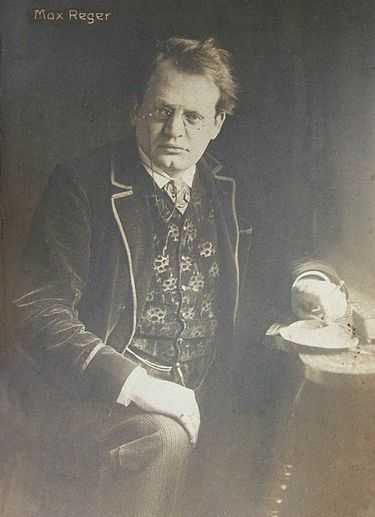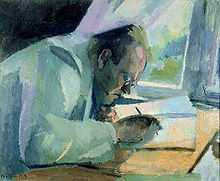Max Reger

Johann Baptist Joseph Maximilian Reger (19 March 1873 – 11 May 1916) was a German composer, conductor, pianist, organist, and academic teacher.
Life
Born in Brand, Bavaria, Reger studied music in Munich and Wiesbaden with Hugo Riemann. From September 1901 he settled in Munich, where he obtained concert offers and where his rapid rise to fame began. During his first Munich season, Reger appeared in ten concerts as an organist, chamber pianist and accompanist. He continued to compose without interruption. From 1907 he worked in Leipzig, where he was music director of the university until 1908 and professor of composition at the conservatory until his death. In 1911 he moved to Meiningen where he got the position of Hofkapellmeister at the court of Georg II, Duke of Saxe-Meiningen. In 1915 he moved to Jena, commuting once a week to teach in Leipzig. He died in May 1916 on one of these trips of a heart attack at age 43.
He had also been active internationally as a conductor and pianist. Among his students were Joseph Haas, Sándor Jemnitz, Jaroslav Kvapil, Ruben Liljefors, George Szell and Cristòfor Taltabull.
Reger was the cousin of Hans von Koessler.
Works

Reger produced an enormous output over little more than 25 years, nearly always in abstract forms. Few of his compositions are well known in the 21st century. Many of his works are fugues or in variation form, including what is probably his best known orchestral work, the Variations and Fugue on a Theme by Mozart based on the opening theme of Mozart's Piano Sonata in A major, K. 331. He also wrote a large amount of music for organ, the most famous being his Toccata and Fugue in D Minor and the Fantasy and Fugue on BACH. While a student under Hugo Riemann in Wiesbaden, Reger met and became friends with the famous German organist, Karl Straube who premiered many of Reger's works for that instrument.
Reger was particularly attracted to the fugal form and created music in almost every genre, save for opera and the symphony. A similarly firm supporter of absolute music, he saw himself as being part of the tradition of Beethoven and Brahms. His work often combines the classical structures of these composers with the extended harmonies of Liszt and Wagner, to which he added the complex counterpoint of Bach. His organ music, though also influenced by Liszt, was provoked by that tradition.

Some of the works for solo string instruments turn up often on recordings, though less regularly in recitals. His solo piano and two-piano music places him as a successor to Brahms in the central German tradition. He pursued intensively, and to its limits, Brahms's continuous development and free modulation, often also invoking, like Brahms, the aid of Bach-influenced polyphony.
Reger was a prolific writer of vocal works, Lieder, works for mixed chorus, men's chorus and female chorus, and extended choral works with orchestra such as Psalm 100 and the Requiem. He composed music to texts by poets such as Otto Julius Bierbaum, Adelbert von Chamisso, Joseph von Eichendorff, Emanuel Geibel, Friedrich Hebbel, Nikolaus Lenau, Friedrich Rückert and Ludwig Uhland.
His works could be considered retrospective as they followed classical and baroque compositional techniques such as fugue and continuo. The influence of the latter can be heard in his chamber works which are deeply reflective and unconventional.
In 1898 Caesar Hochstetter, an arranger, composer and critic, published an article entitled "Noch einmal Max Reger" in a music magazine (Die Redenden Künste 5 nr. 49, s. 943 f). Caesar recommends Reger as "a highly talented young composer" to the publishers. Reger then thanks Hochstetter with the dedications of his Op. 25 and 34.[1]
Reception
He had an acrimonious relationship with Rudolf Louis, the music critic of the Münchener Neueste Nachrichten, who usually had negative opinions of his compositions. After the first performance of the Sinfonietta in A major, Op. 90, on 2 February 1906, Louis wrote a typically negative review on 7 February. Reger wrote back to him: "Ich sitze in dem kleinsten Zimmer in meinem Hause. Ich habe Ihre Kritik vor mir. Im nächsten Augenblick wird sie hinter mir sein!" ("I am sitting in the smallest room of my house. I have your review before me. In a moment it will be behind me!").[2]
Notes
- ↑ "Max Reger Chronology". Max Reger Chronology 1898. Max Reger Institute. Retrieved 2 October 2012.
- ↑ Nicolas Slonimsky, Lexicon of Musical Invective, second edition (New York: Coleman-Ross 1965; paperback reprints, New York and London: W. W. Norton & Company, 1965, reissued 2000. ISBN 9780393320091; Washington Paperbacks WP-52. Seattle: University of Washington Press, 1969, reissued 1974, 1975, 1978, 1981, 1984, 1990. ISBN 9780295785790.), p. 139, also quoted in Fuguemasters and Humormykind. Retrieved 5 April 2013
References
- Traxler, Carol. "Max Reger". Archived from the original on 2009-10-25. Retrieved 2013-10-19.
Further sources
- Bibliography
- Albright, Daniel, ed. (2004), Modernism and music: an anthology of sources. University of Chicago Press. ISBN 0-226-01266-2.
- Anderson, Christopher (2003). Max Reger and Karl Straube: Perspectives on an Organ Performing Tradition. Aldershot, Hampshire: Ashgate Publishing. ISBN 0-7546-3075-7.
- Bittmann, Antonius (2004). Max Reger and Historicist Modernisms. Baden-Baden: Koerner. ISBN 3-87320-595-5.
- Bloesch-Stöcker, Adele (1973). Erinnerungen an Max Reger. Bern: H. Bloesch.
- Cadenbach, Rainer (1991). Max Reger und Seine Zeit. Laaber: Laaber-Verlag. ISBN 3-89007-140-6.
- Grim, William (1988). Max Reger: A Bio-Bibliography. Westport, Connecticut: Greenwood Press. ISBN 0-313-25311-0.
- Häfner, Roland (1982). Max Reger, Klarinettenquintett op. 146. Munich: W. Fink Verlag. ISBN 3-7705-1973-6.
- Liu, Hsin-Hung (2004). "A Study on Compositional Structure in Max Reger Phantasie für Orgel über den Choral, "Hallelujah! Gott zu loben, bleibe meine Seelenfreud!"" D.M.A. dissertation. Seattle: University of Washington.
- Mead, Andrew (2004). "Listening to Reger". The Musical Quarterly 87, no. 4 (Winter): 681–707.
- Mercier, Richard (2008). The Songs of Max Reger: A Guide and Study. Lanham, Maryland: Scarecrow Press. ISBN 978-0-8108-6120-6.
- Reger, Elsa von Bagenski (1930). Mein Leben mit und für Max Reger: Erinnerungen von Elsa Reger. Leipzig: Koehler & Amelang.
- Reger, Max (2006). Selected Writings of Max Reger, edited and translated by Christopher Anderson. New York: Routledge. ISBN 0-415-97382-1.
- Schreiber, Ottmar, and Ingeborg Schreiber (1981). Max Reger in seinen Konzerten, 3 vols. Veröffentlichungen des Max-Reger-Institutes (Elsa-Reger-Stiftung) 7. Bonn: Dümmler. ISBN 3-427-86271-2.
- Williamson, John (2001). "Reger, (Johann Baptist Joseph) Max(imilian)". The New Grove Dictionary of Music and Musicians, second edition, edited by Stanley Sadie and John Tyrrell. London: Macmillan Publishers.
- Filmography
- Max Reger - Music as a perpetual state, documentary by Andreas Pichler and Ewald Kontschieder, Miramonte Film 2002
External links
| Wikimedia Commons has media related to Max Reger. |
| Wikiquote has quotations related to: Max Reger |
 |
Consolation Op. 65 No. 4
Performed by Ulrich Metzner Variations on a Theme by J. S. Bach Op. 52
Performed by Andriy Bondarenko |
| Problems playing these files? See media help. | |
- The Max Reger Foundation of America, New York City
- Max-Reger-Institut, Karlsruhe, Germany (in German)
- Max Reger Archive Meiningen (in German)
- Max Reger on bach-cantatas.com
- Piano recital without Pianist or Max Reger plays Max Reger
- Max Reger at Find a Grave
Music scores
- Free scores by Max Reger at the International Music Score Library Project
- Free scores by Max Reger in the Choral Public Domain Library (ChoralWiki)
- The Mutopia Project has compositions by Max Reger
|